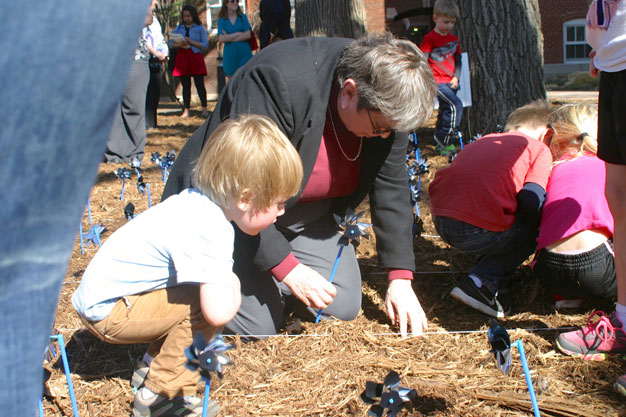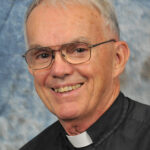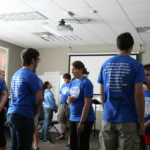
Sister Joan Lescinski, CSJ, helps a student from the Children’s Campus in Davenport plant a pinwheel garden recognizing Child Abuse Prevention Month in this file photo. Sister Lescinski, president of St. Ambrose University in Davenport, will retire in August 2021.
By Barb Arland-Fye
The Catholic Messenger
Sitting with a friend, their feet cooling in the Jordan River while on retreat in the Holy Land, Sister Joan Lescinski, CSJ, received an answer to prayer, the clarity she sought in contemplating retirement as president of St. Ambrose University.
“It was quiet; you could hear people being baptized and they were playing, very gently, hymns in the background. All those things that do lift your soul. I was sitting there thanking God … and I heard myself say ‘2021, that’s the last year.’ Just that clearly.”
She returned from the retreat in May 2019 and that summer spoke with Bishop Thomas Zinkula, who chairs the St. Ambrose University Board of Trustees. “He’s been wonderful to discern with,” Sister Joan said during an interview with The Catholic Messenger after she announced Aug. 25 her plans to retire in August 2021.
She told the bishop, “Any job I’ve ever left, I’ve left with people saying ‘Oh, we wish you wouldn’t go.’ That’s how I always want to leave a job, not with people sort of saying quietly to each other, ‘She should have left two years ago!’”
Sister Joan will have completed 14 years as president when she retires, more than twice as long as the average presidential tenure, according to a study by the American Council for Education (2016), which represents major universities. During her tenure, she has guided St. Ambrose through significant growth in its curriculum and major expansion of its academic, residential and athletic facilities.
The fruits of collaboration
Those accomplishments, none of which she takes credit for herself, led her to begin contemplating when she should retire after she turned 70. “Everything I would say I’m really proud of is the result of the work of so many people in addition to me,” she said. “That’s the one thing about leaders, when good things happen you get the credit but it’s the work of so many, in my case, hundreds and thousands of people who have served with me over these past 13, 14 years.”
The foundation laid by her predecessor has inspired her tenure at St. Ambrose. “Ed Rogalski put St. Ambrose University on the map. It became a university during his presidency. He had the vision to see that we needed to reach out beyond our local area,” she said. “And the university grew. The other thing he did was see that the area of health care was an area the university ought to look at. He was the person who got us going into nursing, occupational therapy and physical therapy,” added Sister Joan. She built on that legacy, adding a Doctor of Occupational Therapy (fully accredited in 2018), a Master of Speech-Language Pathology, a Master of Science in Exercise Physiology, Master of Public Health, and Master of Physician Assistant Studies program, among other graduate and bachelor degree programs.
She said she told Rogalski, “You’re handing me an institution in very good shape … yes, there are a million challenges; we all have them. But, my hope is that I can continue the momentum you have built.” She shared that message with the board as well.
“Presidential transitions are not always easy. Sometimes they are not even civil. I’ve been lucky in both my presidencies (she previously led St. Mary-of-the-Woods College in Indiana) to have a generous predecessor who was willing to help me, introduce me, give me wisdom and counsel … Ed was just magnificent.”
Having completed the major goals she and the board established, she told the trustees a couple of years ago that it was time to think about an endpoint. The board had some additional goals for her to complete, an $8.6 million renovation and expansion of McMullen Hall to create a state-of-the-art home for the College of Business and completion of Phase II of the St. Vincent Center Athletics Complex. She will be able to mark those things off her checklist by the time she leaves the presidency in early August.
Learning and teaching
Over the next 11 months, she will concentrate on navigating St. Ambrose through the ongoing COVID-19 pandemic and preparing to assist the next president that the Board of Trustees appoints following a national search. “I will do whatever the new president wants,” she said. “If the person is a brand new president, some mentoring is often deeply appreciated. If that person has been a president, it may be just showing that person around.”
Following retirement in August 2021, she will take a sabbatical year, taking courses to learn how to teach English as a second language. “I am a teacher in my soul,” Sister Joan said during the news conference at which she announced her retirement. She taught a literature course whenever possible at St. Ambrose. Learning and teaching have been lifelong passions. She remembers at age 7 asking her mother if she would be able to keep learning after she died and went to heaven. Her mother assured her that God would make that happen.
During her sabbatical, Sister Joan also plans to travel, another of her passions. “When you’re in another culture … you’re always slightly off balance, so you’re always learning,” she said.
Sister Joan arrived at St. Ambrose in the fall of 2007 as the university’s 13th president and first woman to hold that position. One of the first groups she spoke to after arriving on campus was the Women’s Connection of the Quad Cities (which in 2011 honored her with its prestigious Athena Award for leadership).
During a Q&A after her talk, someone asked, “What does it mean to be the first woman president of St. Ambrose?” Sister Joan responded that she had been in higher education for a long time, surrounded by men for many of those years. Yes, she had broken the glass ceiling, she told the Women’s Connection audience. “I look forward to the day that we don’t use the word ‘woman’ as an adjective, when it’s simply, ‘I’m the president.’”
She credits her mother, an extrovert who “could walk into a room and everyone loved her,” for instilling in her the ability to address people publicly and confidently. Her parents made their home a welcoming place for all guests, which taught Sister Joan about building relationships and feeling comfortable around a wide variety of people. Excellent education in Catholic schools and the influence of Jesuit spirituality, which she embraced as a student and member of the Sisters of St. Joseph of Carondelet, also contributed to her ability to lead the university in a period of growth and now in a time of challenge because of the COVID-19 pandemic.
Leadership in a pandemic
The planner displayed on a wall in her office in Ambrose Hall looks frozen in time — “March 16, 2020, was the last meeting we held in this room,” she said. “I left it (the planner) up there to remind me how long it has been.”
The greatest challenge from the start of the pandemic’s spread in the U.S. was “how to continue to give our students a good education and keep everybody safe in the process,” she said. “We had to turn on a dime in early March to go online.” Many of the faculty had previously taught online, but a number had not. It has been gratifying to “watch our faculty and staff, with the support of our board, make it all happen. It’s the dedication of our people.”
Much planning took place for students to return to campus for in-person learning. Plans are in place in the event that someone on campus contracts the coronavirus.
Financial challenges resulting from the pandemic also weighed heavily on her mind. Students paid room and board for spring semester but could not return to campus because of the precautions taken then to mitigate spread of the virus. “We refunded several millions of dollars. We had to try to figure out how to preserve cash and cut back on expenses. Everybody worked with us and helped us do it,” Sister Joan said.
She had to lay off some employees. “When you’re an administrator, that’s the hardest thing you ever do,” she said. The worst thing she has had to do is inform a student’s parents that their child has died. “Seven times in my years of presidency I’ve had to call parents and say, ‘your daughter is dead’ or ‘your son is dead.’ That’s the worst possible thing to have to ever say to a parent.”
A spiritual life
The spiritual practices she developed from childhood as a cradle Catholic to adulthood have helped guide her through life’s challenges and triumphs. She is grateful to belong to a religious community (since 1965) that influenced her appreciation for Jesuit spirituality, meditation and Scripture. “All of those have been part of my daily life for 50+ years.” Organic gardening, a gift inherited from her short Italian grandfather, is another spiritual practice. “Planting a little vegetable garden has always been a part of where I’ve lived.” Growing tomatoes, peppers and an array of herbs “is very spiritual to me; it’s a beautiful cycle of life.”
Reflecting on her academic career and the people who recognized her potential, she says, “I’ve loved everything I’ve done. I’ve never wanted to stop doing any of the jobs I ever did. And someone would come along and say, ‘You know you could do a lot more good if you did x or y’ and in every case they’ve been right.”












What a wonderful article about a wonderful lady! Sister Joan is an inspiration for all of us!
Thank you!